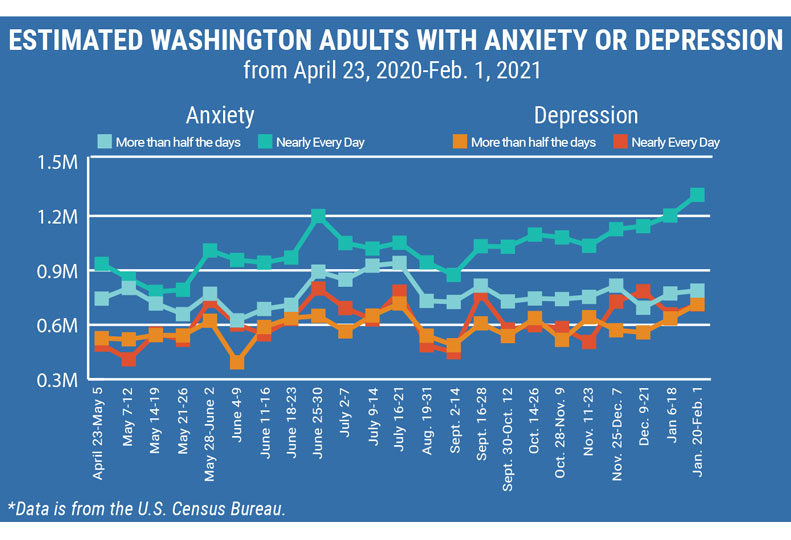
Home » MultiCare, Kootenai Health form behavioral health alliance
MultiCare, Kootenai Health form behavioral health alliance
Organizations to assess service gaps, priorities

February 25, 2021
MultiCare Health System has partnered with Kootenai Health to expand behavioral health services in the Inland Northwest.
The partnership builds on the health care organizations’ shared mission to provide comprehensive health care services, says Tim Holmes, president of MultiCare’s Behavioral Health Network.
“As we were looking at the various needs within the Northwest, behavioral health was one of the significant areas that the community and service providers identified as needing additional focus and increased access,” says Holmes.
MultiCare, a Tacoma-based health care network, has an extensive presence in the Spokane area, and Coeur d’Alene-based Kootenai Health has been growing its network in North Idaho.
“Kootenai has a positive reputation in northern Idaho,” says Holmes. “It’s often best to work with others when it comes to establishing services if others already have a strong foundation that we can build together, rather than starting almost from scratch when it comes to our behavioral health care delivery in the Inland Northwest.”
Kootenai Health also currently works with the Coeur d’Alene-based Northern Idaho Crisis Center, a free, regional resource that is designed to help people experiencing a mental health crisis, drug, or alcohol problems.
The two health care organizations have created a joint oversight committee, with four members from Kootenai Health and four from MultiCare to allow for equal representation for both systems.
Additionally, the partnership between Kootenai and MultiCare will create two new positions to oversee the behavioral health agenda, says Holmes, a physician medical director and an executive director. The search for candidates is currently underway, he adds.
The committee is working on a comprehensive needs assessment to determine care gaps between the two organizations, says Holmes, so a priority goals list can be established.
Preliminarily, he says, that could be ensuring that behavioral health care services are colocated within primary or specialty care locations where behavioral health care services typically don’t exist.
MultiCare currently has behavioral health services available in about 12 primary care offices, he says, adding “the vision is to expand access,” and have behavioral health services located within all of MultiCare’s primary care locations.
“I would say that within the next couple of years we should be able to fully actualize that,” he adds.
People with behavioral health needs often also have comorbid chronic diseases, which is why MultiCare has worked to colocate those services in primary care or specialty offices, contends Holmes.
“People with diabetes oftentimes can have depression or people with congestive heart failure may have depression,” he says. “So, providing outreach and engagement services is really important.”
There also have been significant gaps in geriatric psychological services, he adds.
MultiCare also offers behavioral health services in over 50 schools and provides a variety of outreach and crisis services to people in need.
“What we’ve found is people are much more likely to access care in those environments. There’s still a fair amount of stigma associated with mental health disorders or needs, and any way that we can create access or eliminate barriers to that access is a benefit to people,” says Holmes. MultiCare has over 50 different behavioral health care programs, he adds.
Currently, the organization has over 1,500 behavioral health employees throughout its system.
Kootenai Health offers an adult-inpatient psychiatric unit, a children and adolescent inpatient youth acute unit, chemical dependency inpatient and intensive outpatient programs for adults, and a mental health outpatient program for adults.
The need for these services is only growing, contends Holmes.
“We’ve seen increasing rates of depression and anxiety and suicidal ideation and suicide attempts, which is very concerning in particular,” he says. “This trend has been occurring really for the last decade or so, and we’ve seen an increase since the pandemic hit as well.”
According to the Washington state Department of Health’s Jan. 4 COVID-19 Behavioral Health Impact Situation Report, all five behavioral health indicators monitored by the DOH exceeded 2019 levels for the fourth straight reporting period. The five indicators are psychological distress, suicidal ideation, suspected suicide attempts, suspected overdoses by all drugs, and alcohol.
The report also notes that people in need of both behavioral and physical health care may have changed care-seeking behaviors in response to COVID-19.
Additionally, a statistical warning was observed for alcohol-related emergency department visits among adults aged 18 to 44, according to the report.
Data about beer and wine, and cannabis tax revenue also showed a year-over-year increase throughout 2020 compared with 2019. There was also a year-over-year increase in FBI background checks for handgun purchases.
“At any given time when you look at the prevalence of behavioral health needs, the data usually shows that one in five adults could be diagnosed with a mental health disorder,” says Holmes. “We’re seeing that continue to increase closer toward 25% of the population.”
Holmes says MultiCare has several behavioral health partnerships with other health care networks, including a joint venture with the Wellfound Behavioral Health Hospital, in Tacoma, which is part of the CHI Franciscan health care system based in Tacoma.
The organization also works with Navos, a community mental health and wellness center in Seattle; Greater Lakes Mental Health, in Lakewood, Washington; and Sea Mar Behavioral Health, a state-licensed community mental-health agency.
Latest News Up Close Health Care North Idaho
Related Articles
Related Products



